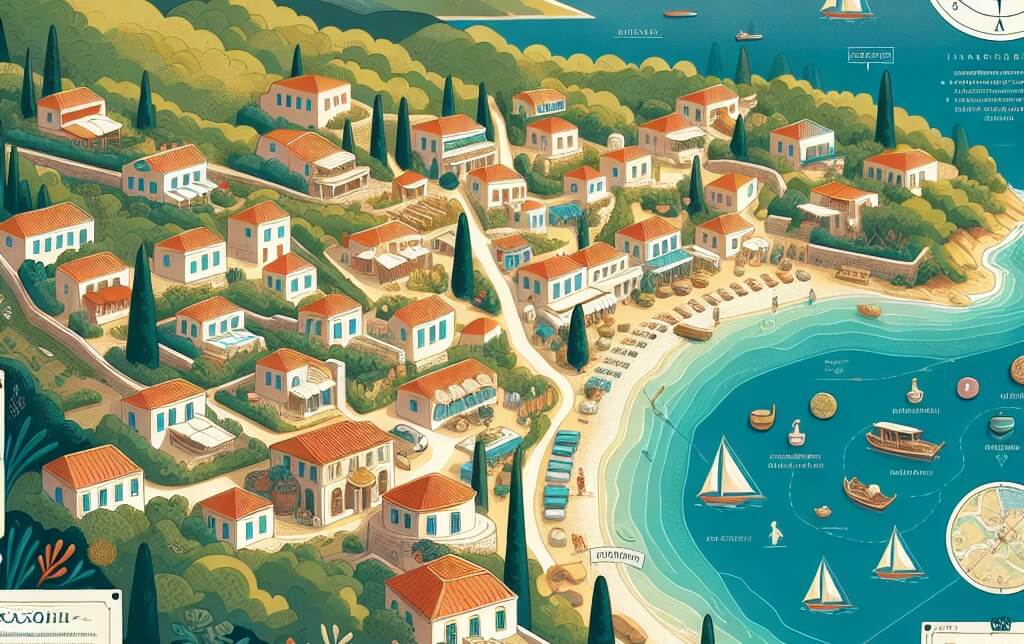
Discover the charm of Megara in Greece
Nestled along the Saronic Gulf, Megara in Greece exudes a timeless charm that captivates visitors with its rich history and picturesque landscapes. Steeped in ancient mythology and historical significance, Megara offers a unique blend of cultural heritage and natural beauty. The town's well-preserved archaeological sites, such as the ancient theater and city walls, provide a glimpse into its illustrious past. Stroll through the charming streets lined with traditional tavernas and cafes, where the warm hospitality of the locals invites you to savor authentic Greek cuisine. With its tranquil beaches and stunning sea views, Megara is a hidden gem waiting to be explored by those seeking a genuine Greek experience.
Introduction
The introduction of Megara, a city-state in ancient Greece, serves as a crucial starting point for understanding its historical significance and cultural contributions. Situated strategically between Athens and Corinth, Megara played a pivotal role in the political and economic dynamics of the region. As one of the oldest Greek settlements, Megara boasted a rich tradition of philosophy, particularly through the teachings of Euclid and Eubulides. Furthermore, the city's strategic location along the Isthmus of Corinth facilitated trade and maritime activities, contributing to its prosperity and influence in the ancient world. By delving into the history and achievements of Megara, a deeper appreciation for the complexities of ancient Greek civilization can be gained.
Geographical Location
The geographical location of Megara, Greece, plays a significant role in shaping its historical and cultural identity. Situated in the northeastern part of the Peloponnese peninsula, Megara boasts a strategic position overlooking the Saronic Gulf. This location facilitated trade and maritime activities, contributing to the city's prosperity in ancient times. Additionally, Megara's proximity to Athens and Corinth allowed for cultural exchanges and political interactions, influencing the city's development. The surrounding natural landscape, characterized by rugged mountains and fertile plains, further influenced the economy and lifestyle of the inhabitants. Overall, the geographical location of Megara has been a defining factor in its historical trajectory and continues to shape its identity to this day.
Historical Background
The historical background of Megara, Greece, is rich and varied, dating back to ancient times. Megara was originally founded as a colony of Corinth in the 8th century BC, and it quickly became an important city-state in the region. Known for its strategic location on the Isthmus of Corinth, Megara played a significant role in trade and politics throughout the classical period. The city was also known for its philosophical tradition, with notable figures such as Euclid of Megara contributing to the development of early Greek philosophy. Megara's history is marked by periods of prosperity, conflict, and cultural achievement, making it a fascinating subject for further study and exploration.
Megara in Ancient Times
Megara, an ancient city-state in Greece, played a significant role in the history of the region during ancient times. Situated strategically between Athens and Corinth, Megara was a powerful and influential city known for its skilled craftsmen and robust trade networks. The Megarians were known for their strong military capabilities and often engaged in conflicts with neighboring city-states. Additionally, Megara was renowned for its contributions to philosophy, with notable thinkers such as Euclid and Eubulides originating from the city. Overall, Megara's rich history in ancient times exemplifies its importance as a key player in the political, economic, and intellectual landscape of ancient Greece.
Battle of Megara
The Battle of Megara was a significant military engagement that took place in ancient Greece. It occurred between the city-state of Megara and its neighboring city-states. The battle was a key event in the broader regional conflicts of the time, highlighting the strategic importance of Megara in the region. The outcome of the battle had far-reaching consequences for the political landscape of ancient Greece, shaping alliances and power dynamics among the city-states. The Battle of Megara underscored the fierce competition and rivalries that characterized the Greek city-states during this period, emphasizing the importance of military prowess and strategic positioning in the ancient world.
Relationship with Other Greek City-States
Megara, a city-state in ancient Greece, had a complex relationship with other Greek city-states. Situated strategically between Athens and Corinth, Megara found itself often caught in the middle of conflicts and alliances. Despite its small size, Megara played a significant role in regional politics and warfare. The city-state maintained close ties with Sparta, forming a strong military alliance that allowed it to assert its power in the region. However, Megara's relationship with Athens was marked by frequent tensions and rivalries, leading to periods of conflict and hostility. Overall, Megara's interactions with other Greek city-states were characterized by a delicate balance of cooperation and competition, as it navigated the intricate web of alliances and rivalries that defined the ancient Greek world.
Archaeological Discoveries
Archaeological discoveries in the region of Megara, Greece, have provided valuable insights into the ancient history and culture of this significant area. Excavations have unearthed evidence of ancient settlements, temples, and tombs, shedding light on the daily life, religious practices, and social structures of the inhabitants. These discoveries have helped archaeologists and historians piece together the puzzle of the region's past, allowing for a deeper understanding of its significance in the broader context of ancient Greek civilization. The meticulous study and preservation of these findings are crucial in preserving the cultural heritage of Megara and contributing to the collective knowledge of the ancient world.
Modern Megara
Modern Megara, a city located in Greece, has evolved significantly from its ancient roots. Today, Megara is a bustling urban center that combines historical charm with modern amenities. The city is known for its picturesque coastal views, vibrant culture, and strong sense of community. With a thriving economy and a focus on sustainable development, Megara has become a desirable destination for both tourists and residents alike. Its strategic location near Athens and the Corinth Canal has contributed to its growth and importance in the region. Overall, modern Megara stands as a testament to the resilience and adaptability of Greek cities in the face of changing times.
Saronic Gulf
The Saronic Gulf is a significant body of water located in Greece, near the town of Megara. It is known for its crystal-clear waters, picturesque coastal towns, and historical significance. The Gulf serves as a popular sailing destination, attracting tourists and locals alike with its stunning landscapes and tranquil atmosphere. Additionally, the Saronic Gulf plays a vital role in the economy of the region, supporting various industries such as fishing, tourism, and transportation. Its strategic location has also made it a key area for trade and commerce throughout history. Overall, the Saronic Gulf is a valuable and culturally rich part of the Greek landscape, offering both natural beauty and economic opportunities to the surrounding communities.
Megara BC
Megara, a city-state in ancient Greece, played a significant role in the region's history during the archaic period. Situated strategically between Athens and Corinth, Megara was known for its strong military and political influence. The city was a key player in various conflicts and alliances, often aligning with Sparta against Athens. Megara also made notable contributions to philosophy and literature, with prominent figures such as Theognis and Euclid hailing from the city. Despite facing challenges such as territorial disputes and economic struggles, Megara's legacy endures as a testament to its importance in the ancient Greek world.
Peloponnesian League
The Peloponnesian League was an alliance of city-states in ancient Greece, primarily led by Sparta, formed to counter the power of the Athenian Empire. The league consisted of various city-states in the Peloponnese region, including Corinth, Elis, and Megara. Megara's strategic location along the Isthmus made it a valuable member of the league, providing military and economic support to its allies. The Peloponnesian League played a significant role in the power struggles and conflicts of the time, most notably the Peloponnesian War between Athens and Sparta. The league's formation and actions exemplified the complex dynamics of Greek city-state politics and the constant competition for power and influence in the region.
Conclusion
In conclusion, the city-state of Megara played a significant role in ancient Greece, particularly in terms of its strategic location and economic activities. Situated between Athens and Corinth, Megara served as a crucial link in trade routes and as a buffer against potential invasions. The city's agricultural production, including its renowned Megarian pottery, also contributed to its prosperity and influence in the region. Despite facing periods of political instability and conflict with neighboring city-states, Megara's legacy endures as a testament to the complex dynamics of power and commerce in ancient Greece.









